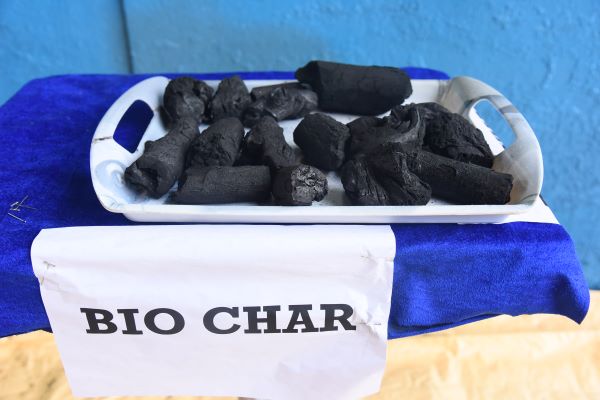
Team News Riveting
Rourkela, August 27
In a significant advancement toward reducing carbon emissions in steel production, SAIL, Rourkela Steel Plant (RSP) in collaboration with SAIL, RDCIS has successfully initiated the use of Biochar in Blast Furnace #1 of RSP.
Atanu Bhowmick, Director In-Charge, Rourkela Steel Plant (RSP) charged the first biochar during the historic trial of biochar injection on 24th August 2024. Present on the occasion were S R Suryawanshi, ED (Works), Tarun Misra, ED (HR) with additional charge of ED (Projects), Sandip Kumar Kar, ED (RDCIS), Alok Verma, ED (Mines), A K Behuria, ED (F&A), CGMs and senior officials of RSP and RDCIS.
Speaking on the occasion, Bhowmick said, “We are proud to be at the forefront of this transformative initiative in entire SAIL. By integrating Biochar into our operations, we are taking a significant step towards reducing our carbon footprint and advancing our commitment to sustainable development”. He also exhorted the Blast Furnace collective to follow all safety norms in the workplace.
Suryawanshi highlighted the importance of this initiative in achieving the goal of carbon neutral by the steel plant. Sandip Kar briefly explained the working and benefits of Biochar injection in Blast Furnaces.
It is noteworthy that to cut down the CO2 emissions, SAIL is exploring innovative solutions such as the use of biochar, a stable form of carbon derived from biomass through a process known as pyrolysis. This process thermally decomposes biomass—originating from plants and animals—in the absence of oxygen, producing biochar, which can be utilized to partially replace traditional Pulverized Coal Injection (PCI) coal in blast furnaces. Laboratory studies and trials conducted by RDCIS have identified babool and bamboo-based biochar as suitable replacements for PCI coal. These materials, derived from fast-growing, CO2-absorbing trees and plants, are considered carbon neutral and are abundant in various regions of India.
The successful trial of this technology is a collaborative effort led by team from RDCIS and Blast Furnaces of RSP.



